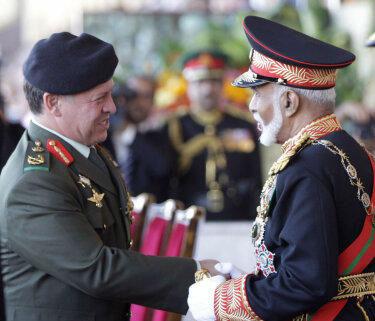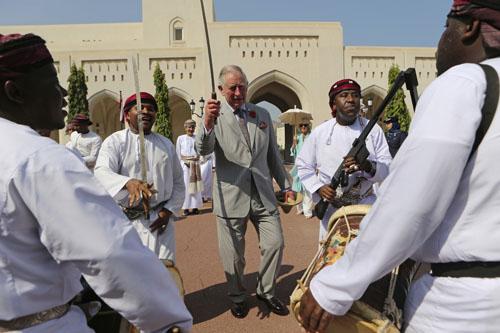You are here
Oman Sultan Qaboos passes away aged 79
By AFP - Jan 11,2020 - Last updated at Jan 11,2020

Oman's Sultan Haitham Bin Tariq speaks during a swearing in ceremony as Oman's new leader, after the death the previous day of Sultan Qaboos, on Saturday (right) Oman's late Sultan Qaboos Bin Said salutes at the start of a military parade at a stadium in Muscat on the occasion of the sultanate's 40th National Day on November 29, 2010 (AFP photo)
MUSCAT — Sultan Qaboos, the longest-reigning leader of the modern Arab world, has died at the age of 79.
"With great sorrow and deep sadness... the royal court mourns His Majesty Sultan Qaboos Bin Said, who passed away on Friday," the royal court said in a statement, as discussions on a successor commenced.
Qaboos, who has ruled since 1970, had been ill for some time and had been believed to be suffering from colon cancer. He was unmarried and had no children or brothers.
Sultan Qaboos was laid to rest at the royal cemetery on Saturday after his coffin, draped in the Omani flag, was driven through the streets of the capital Muscat.
Thousands of people, including members of the royal family and state officials, were present for prayers at the main mosque which is named after the sultan.
The royal court announced a mourning period that will see businesses and government offices close for three days.
Sultan Qaboos was born on November 18, 1940, into the centuries-old Al Said dynasty in the southern provincial capital of Salalah, in an isolated country on the margins of the modern world.
Older Omanis recall the capital Muscat had no electricity or running water and the gates of the medieaval city were locked at dusk.
The young Qaboos was sent abroad for his education to Britain, attending the elite Sandhurst Royal Military Academy from where he graduated in 1962.
He went on to join a British infantry battalion in Germany, returning home to bide his time under the close watch of his father, Sultan Said bin Taymur.
Guardian of the Strait
Oman is strategically located on the Strait of Hormuz — the narrow seaway through which much of the world's oil supply passes — and between regional rivals Iran and Saudi Arabia.
Sultan Qaboos maintained good ties with both nations, a balancing act that made his capital a must-stop for Western and Arab diplomats as well as military chiefs alike.
The sultan's first foreign trip was to Iran, whose shah — along with the British — helped him quell the Marxist insurgency he inherited from his father in the restive Dhofar region.
Muscat would serve as the back channel for talks between the United States and Iran in the lead-up to a landmark 2015 nuclear deal.
Qaboos also worked to preserve ties with Saudi Arabia and the rest of the wealthy six-nation Gulf Cooperation Council to which Oman belongs, but stuck to his principle of non-interference.
Muscat also maintained close military and economic ties with Britain and the US.
Qaboos assumed power as an unknown and spent his first years cultivating the respect of his countrymen, from the mountainous interior to the coast.
Qaboos channelled revenues from fledgling oil exports into infrastructure, taking the country from having just a handful of primary schools and some 8 kilometres of paved roads to a modern state with well over 1,000 schools and a massive highway network.
The sultan also commissioned an opera house for Muscat, its packed calendar a testament to his support for the arts.
New ruler
Oman’s new royal ruler pledged Saturday to follow the non-interference policy that made the kingdom a vital regional mediator under his late cousin Sultan Qaboos who reigned for half a century.
Haitham Bin Tariq, the culture minister, was sworn in shortly after modern Oman’s founding father was laid to rest after his death on Friday at the age of 79.
“We will follow the path of the late sultan,” Haitham, 65, said in his first public speech which was aired live on state television.
He expressed support for “our country’s foreign policy of peaceful living among nations and peoples... and not interfering in the internal affairs of others, respecting nations’ sovereignty and international cooperation.”
Related Articles
MUSCAT — Oman's sultan has issued a new law on the appointment of a crown prince for the first time in the country's history, aimed at creat
AMMAN — His Majesty King Abdullah has sent a cable to Sultan Haitham Bin Tariq Bin Taimour Al Said of Oman, expressing condolences over the
MUSCAT — Oman’s Sultan Qaboos held talks with Britain’s Prince Charles and his wife Camilla, in his first announced meeting with foreign dig
















